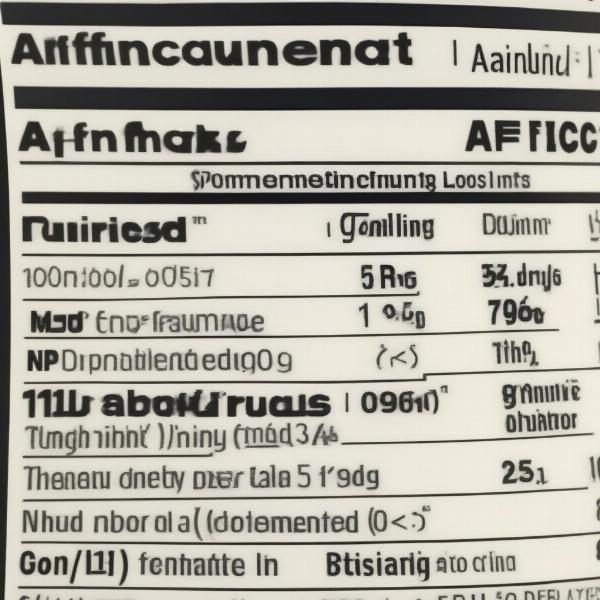Choosing the right dog food for a sensitive stomach can be a challenge. Many factors can contribute to digestive upset in dogs, from food allergies and intolerances to inflammatory bowel disease and pancreatitis. Finding a dog food that soothes your dog’s digestive system while providing complete nutrition is crucial for their overall health and well-being. This guide will help you understand the causes of sensitive stomachs in dogs, identify the best dog food ingredients, and choose the right diet for your furry friend.
Understanding Sensitive Stomachs in Dogs
What exactly constitutes a “sensitive stomach”? Symptoms can range from mild discomfort and occasional vomiting to chronic diarrhea and significant weight loss. Common signs include:
- Vomiting
- Diarrhea
- Gas
- Bloating
- Loss of appetite
- Itching and skin irritation (sometimes a sign of food allergies)
If your dog exhibits any of these symptoms, it’s essential to consult with your veterinarian to rule out any underlying medical conditions. Once any serious illnesses are ruled out, you can begin to explore dietary changes.
Choosing the Right Dog Food for Sensitive Stomachs
Selecting the best dog food for a sensitive stomach involves careful consideration of ingredients. Look for foods that:
- Contain a single source of novel protein: Proteins like lamb, duck, venison, or fish are less common in commercial dog foods and therefore less likely to trigger an allergic reaction.
- Are limited ingredient diets: Fewer ingredients reduce the chance of encountering a problematic ingredient for your dog.
- Are easily digestible: Look for foods that are high in fiber and contain prebiotics and probiotics to support healthy gut flora.
- Avoid common allergens: These include beef, chicken, dairy, wheat, corn, and soy.
- Are grain-free (if necessary): Some dogs are sensitive to grains, though this is less common than protein allergies.
Types of Dog Food for Sensitive Stomachs
There are several types of dog food formulated for sensitive stomachs:
- Dry kibble: Convenient and cost-effective. Look for formulas with highly digestible ingredients.
- Wet food: Often more palatable for picky eaters and can be beneficial for dogs who need extra hydration.
- Homemade food: Allows for complete control over ingredients but requires careful balancing of nutrients. Consult with a veterinary nutritionist for guidance.
- Prescription diets: Formulated for specific digestive issues and available through your veterinarian.
Transitioning to a New Food
When introducing a new dog food, it’s important to transition gradually to avoid further digestive upset. Start by mixing a small amount of the new food with your dog’s current food and gradually increase the proportion of new food over 7-10 days.
What to Look For on the Label
Deciphering dog food labels can be tricky. Here are some key things to look for:
- AAFCO statement: Indicates the food meets the Association of American Feed Control Officials’ nutritional standards.
- Guaranteed analysis: Provides the minimum percentages of crude protein, fat, fiber, and moisture.
- Ingredient list: Listed in descending order by weight.
 Reading Dog Food Label for Sensitive Stomachs
Reading Dog Food Label for Sensitive Stomachs
Conclusion
Finding the right dog food for a sensitive stomach requires patience and careful observation. By understanding the causes of digestive upset, choosing the right ingredients, and transitioning gradually to a new food, you can help your furry friend enjoy a happy and healthy digestive system. Always consult with your veterinarian for personalized advice and guidance.
FAQ
- What are the most common food allergens for dogs? Beef, chicken, dairy, wheat, corn, and soy are among the most common.
- Is grain-free food always better for sensitive stomachs? Not necessarily. Some dogs are sensitive to grains, but others thrive on them. It’s important to identify the specific trigger for your dog’s sensitivity.
- How long will it take to see improvement after switching foods? It can take anywhere from a few days to several weeks to see noticeable improvement.
- Can I make homemade food for my dog with a sensitive stomach? Yes, but it’s crucial to consult with a veterinary nutritionist to ensure the diet is nutritionally balanced.
- What should I do if my dog continues to have digestive issues despite dietary changes? Consult with your veterinarian to rule out any underlying medical conditions.
Related Articles:
- best dry dog food for sensitive stomachs uk
- senior dog food for sensitive stomach
- wholesomes dog food sensitive stomach
- dog food sensitive stomach
About ILM Dog: ILM Dog provides expert advice and resources on all aspects of dog care, from breed selection and puppy care to senior dog health and training. Our goal is to empower dog owners with the knowledge and tools they need to provide the best possible care for their furry companions. We offer guidance on nutrition, health, grooming, and finding the right products for your dog’s specific needs, such as finding the perfect best wet dog food for sensitive stomachs uk. For personalized advice, contact us at [email protected] or +44 20-3965-8624.